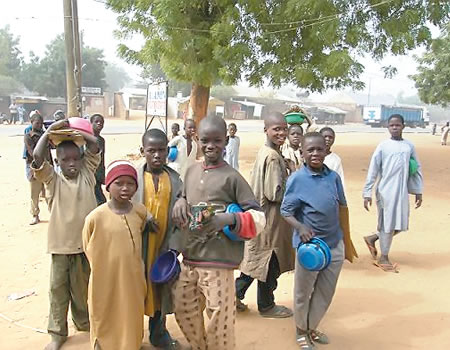In this report, SHEHU BELLO writes that so many underaged children roam the streets of Lagos trying to survive in an environment that even adults find socio-economically gripping.
FOR the most part of the day, they roam the streets searching for something to eat and basically trying to survive. Some engage in menial jobs, some engage as understudy to area boys who collect money from motorists and some as bus conductors. As things get tougher for them they move into the inner recess of society and begin to engage in petty crime, peddling marijuana, pick-pocketing and sundry crimes.
They may differ in character, religion, culture and age, but one thing unites them – trying to survive on the street amidst crushing poverty.
For them, everyday is the same; roaming the streets, without any idea of where the next meal would come from or where they would spend the night.
Welcome to the world of children whose survival depends on the street. Though today is the International Day of Children victims of Aggression, the society seems not to care much less do something about the socio economic aggression that many children face on the street on a daily basis.
Audu is a 10-year-old boy but he has mastered the art of surviving on the street. Like many children of his age surviving around Ketu Bridge, he is from the Northern part of the country but does not know the state in particular. He could do any job as long as it would fetch him some money that would keep his body and soul together.
A particular decrepit building in the area close to a canal houses many underaged children. All sorts of vices go on there and Audu is one of the many children who live in the area.
“I don’t have a permanent job. I do any work, anything that gives me little change. I don’t know the state I am from, but I was born in Lagos and my mother is also on the street, but I don’t know where she’s now, though we see atimes,” Audu told Sunday Tribune adding that he would be glad if he could be enrolled in school.
Babangida Alimi, 20-year-old, an indigene of Sokoto State, interviewed by Sunday Tribune at Ojodu-Berger area of Lagos, helps travellers to carry their luggages for survival. He came to Lagos two years ago after his secondary school education in search of greener pasture.
“I am from Sokoto State. I finished my secondary school education in 2014, but left Sokoto State in 2015. When I first came, it was a bit easy, as there were jobs. I engaged myself as a labourer, but I had to leave the job, when things became difficult and jobs dropped.
“So my friend, with whom I was doing the casual labourer job, asked me if I was interested in carrying loads for travellers in Berger. That was before work started work on the new Berger Bus Park, but now since the government demolished the park, it has been hard for me and I don’t even know what to do again,” he stated.
Asked for where he sleeps, Babangida said, “I sleep anywhere. But mostly I sleep at the secretariat and atimes in a mosque. But before the motor park was removed, I usually sleep in Berger park; as you know, some travellers usually arrive late in the night and would be tired to carry their loads and that’s when we make money most.”
Babangida, also told Sunday Tribune, that it would be nice if the government could engage people like him, as he was capable enough to do any job.
Innocent Sunday, a 15-year-old indigene of Imo State, is in the same boat with Babangida. He left his village because his parents could not take care of their family adequately.
“There was no money at home and it wasn’t easy for us; I decided to leave home and look for something to do. I have been here for three weeks and it hasn’t been easy all through, as the area boys usually disturb us. They usually demand for money from us and if we don’t have, they beat us and ask us to leave this place and only come back when we have.
His co-traveller in street survival, Ayomide Salako, a 17-year-old, is from Ogun State. He decided to seek better fortune on the street due to socio-economic situation in his family.
“I came out to the street due to family issue. I was formerly in Oshodi, but because of policemen raiding and harassing us continuously, I decided to leave that place and come here. I have been living on the street for more than a year, but only got to this place last month. I engage myself as a conductor and atimes as a porter.
“It wasn’t easy at home. There was no food, nothing; so I decided to leave and look for something to do,” Ayomide said. When asked where he sleeps at night, “anywhere” came the reply.
“While in Oshodi one could sleep under the bridge or inside parked yellow buses; but now since the whole place has been demolished, some of us left and came here. Here, we atimes sleep in the mosque or the secretariat and sometimes we go inside Denro Area, to look for abandoned buildings and pass the night there,” he stated.
Also in Ketu area, Fayemi Olakunle, an 18-year-old load carrier in Berger Area also has a sad tale on what brought him to the street.
Surviving on the street is something he never wished for, but forced to do after the death of his father. Now he must survive willy-nilly.
“Since my dad died, it has been hard for us. I was in SS1 when he died and had to drop from school, as my mum couldn’t continue with the payment of my school fees and to also feed the family.
“I would be glad if I can get something doing. I atimes interchange between Berger and Ketu. Atimes I engage in conductor job, which is why you are seeing me here; sometimes I engage in carrying loads for travellers at Berger, mostly during the night.
“It is hard here and also in Berger. Those guys you see in Berger are not nice at all. They usually beat us or send us away if we don’t give them money, which is why I sometimes don’t stay too long there,” he said.
In Ibadan, the story is not different. As early as the hours of 7 a.m, in busy and commercial locations such as Bodija, Mokola Round About, Dugbe, and Mobil Junction at Ring Road, the children could be found. One would reason that children of those ages ought to be in school or at worst be preparing for school at that early hour of the day, but the reverse is the case. They troop out in their numbers in search of their daily bread.
Their targeted clients are mainly those who alight from buses, cabs, cars as well as motorbikes. Hardly will you see them following those walking by. Getting closer to them, Sunday Tribune discovered they could not communicate in English, with only few of them being able to communicate sparingly in Yoruba but they speak Hausa fluently.
When they want to ask for alms, they gesture or signal to people by putting their hands in their mouths meaning they need money for food. Aside the fact that these children are not in school one other thing is that they are vulnerable to accidents and could fall into the hands of ritual killers. These children don’t have a house to call home as they settle for any space to spend their nights.
One of the children who should not be more than 6 years old, gave her name as Halimat, she doesn’t speak Yoruba well; to her school is a place she will attend “tomorrow.” With her is a white polythene bag which she uses in keeping her proceeds. Her mum is not in any way near. She said she is at Oja Oba, and that they sleep at the Oja Oba market.
Another group of children between the ages of 5 and 13 years, sat inside a culvert opposite Mobil filling station at Ring Road, patiently waiting for those who alight from bikes. When anyone on bike alights they rush to meet such person pointing at their mouth, signaling that they need money for food.
Halimat who seems to be the youngest, the most active and agile amongst them, was very much at hand to help call their attention. As they approached, she told them Sunday Tribune was going to give them money. When they came closer, they found out there was no money, but that did not in any way deter them.
A token as low as N50 brings smiles to their faces. Though they hope to be in school but that remains a pipe dream.
As these children continue to roam the streets, it is apparent that no one cares about them meaning that the menace may continue for sometime to come.
—Additional story by Daniel Akeju







